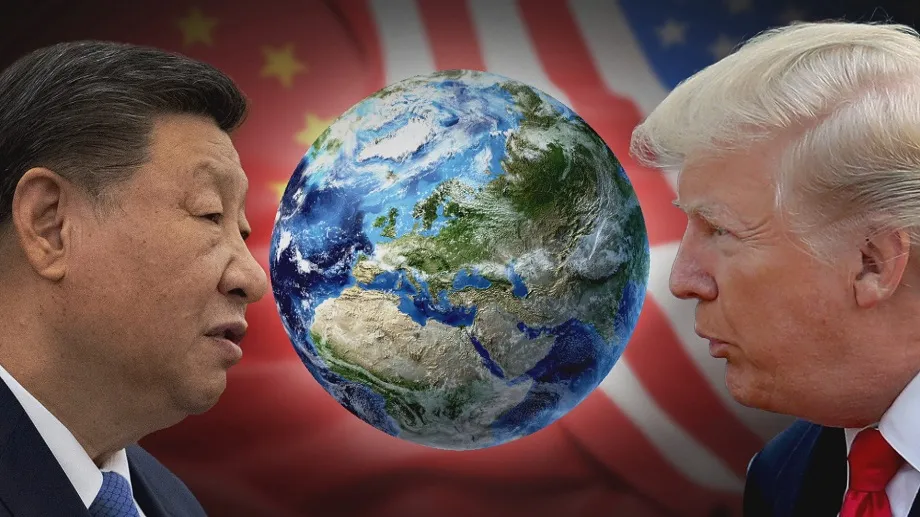Islamabad, April 11: The ongoing trade tensions between the United States and China escalated further as Beijing announced on Friday that it would raise tariffs on American goods to 125 percent, while declaring that it would disregard any future increases imposed by President Donald Trump.
China argued that it no longer made economic sense for its importers to continue sourcing products from the United States under the current tariff structure.
Following a tumultuous week in global markets, where both economic giants exchanged trade blows, Chinese officials dismissed Trump’s increasingly aggressive tariff strategies as nothing more than a “joke” and a “numbers game.”
They accused Washington of causing widespread disruption through its sweeping tariffs, which have impacted economies around the globe, and held the United States fully accountable for the ensuing market chaos.
Trump has used aggressive tariffs as a tool to pressure manufacturers to relocate operations to the United States and to push foreign governments into reducing trade barriers on American products.
However, after a week of severe market instability, he paused many of the new tariffs for a 90-day period, though he simultaneously raised levies on Chinese imports to an extraordinary 145 percent.
In response, China announced its own round of retaliatory tariffs, bringing its total to 125 percent, set to take effect on Saturday.
China’s Reaction
Nevertheless, the Chinese finance ministry stated that any additional US tariffs would be ignored moving forward, claiming that American goods had become unviable in the Chinese market at such high tariff levels.
China’s commerce ministry reinforced this stance by saying the US’s repeated imposition of “abnormally high” tariffs had devolved into a numbers contest that no longer held any real economic value.
A spokesperson added that any further escalation from the US side would be disregarded entirely.
In parallel with these actions, Beijing declared its intention to lodge a formal complaint with the World Trade Organization (WTO) over the latest wave of US tariffs.
Despite the global economic fallout and the mounting criticism from market watchers, President Trump remained defiant.
Read More: Trump Presses 90-Day Tariff Pause Button for Most Countries
He acknowledged the transitional challenges created by his policies but maintained that they would ultimately lead to positive outcomes, describing the process as a “beautiful thing.”
Trump praised the European Union for not immediately retaliating and implied that their decision was influenced by the strong measures taken against China.
EU Stance
Nevertheless, EU Commission President Ursula von der Leyen indicated in an interview with the Financial Times that Europe still possessed a broad range of countermeasures should negotiations with the United States collapse.
She mentioned the possibility of imposing levies on digital advertising revenues as a bloc-wide response.
French President Emmanuel Macron echoed this sentiment, calling for the EU to continue developing its own retaliatory tools.
Speaking on social media, he emphasized that Europe needed to stand firm and prepare comprehensive responses alongside the European Commission.
Meanwhile, in a meeting with Spanish Prime Minister Pedro Sanchez, Chinese President Xi Jinping urged closer cooperation between China and the European Union in resisting what he described as unilateral bullying practices.
Xi stated that such collaboration would not only protect their shared rights and interests but also uphold international fairness and justice.
The escalating trade war had immediate effects on global markets, with Wall Street experiencing new losses and Asian markets once again coming under pressure.
Read More: Trump’s Auto Tariffs May Cost Automakers $108B
Tokyo’s stock market dropped more than 4 percent, reversing a 9 percent surge the day before, while markets in Sydney, Seoul, and Singapore also declined. European markets mirrored this downturn in response to China’s latest retaliatory move.
Investors, shaken by the unpredictability of Trump’s trade policies, flocked to safer assets like gold, which surged to a new record above $3,200. At the same time, the US dollar and oil prices fell, while the reliability of US Treasuries was brought into question.
Temporary Tariff Freeze Evaporating
Stephen Innes of SPI Asset Management noted that any optimism from Trump’s temporary tariff freeze was evaporating quickly, and he bluntly summarized the situation by saying that the world’s two largest economies are now entrenched in a full-scale trade war with no winners.
Critics of Trump’s trade approach argue that his tariffs are generating instability for businesses with complex global supply chains, alienating international allies, and ultimately driving up costs for American consumers.
However, Trump’s Commerce Secretary Howard Lutnick struck a more optimistic tone on social media, suggesting that a “Golden Age” was approaching and asserting that the administration remained dedicated to defending US interests, pushing for global negotiations, and pursuing significant economic growth.
Also Read: Pakistan Plans Response to US Tariffs – Forms Committee
Trump has not ruled out reinstating the full set of tariffs after the 90-day pause, warning that if negotiations fail to yield a favorable deal, his administration would revert to its previous position.
Canadian Prime Minister Mark Carney described Trump’s pause as a welcome development and indicated that Ottawa would begin economic negotiations with Washington following the upcoming April 28 elections.
In the meantime, Vietnam has agreed to initiate trade talks with the United States, while Pakistan is preparing to send a delegation to Washington.
As Beijing continues its efforts to rally international support against the US trade offensive, President Xi is scheduled to visit Vietnam, Malaysia, and Cambodia next week, with the trade conflict expected to be a prominent topic on the agenda.









